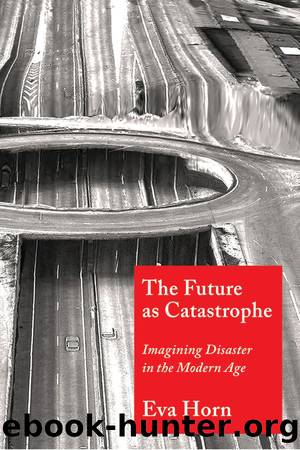The Future as Catastrophe: Imagining Disaster in the Modern Age by Eva Horn

Author:Eva Horn [Horn, Eva]
Language: eng
Format: epub
Tags: Literary Criticism, Comparative Literature, Performing Arts, Film, History & Criticism, Science Fiction & Fantasy
ISBN: 9780231547956
Google: e2NbDwAAQBAJ
Publisher: ColumbiaUP
Published: 2018-09-18T20:27:30+00:00
A CHAIN OF UNFORTUNATE EVENTS: THE IMPROBABLE ACCIDENT
There are, however, different types of accidents, inspiring entirely different images, narratives, and forms of knowledge. Whereas the crash is an individualized and singular event, a fleeting moment, there are accidents such as Chernobyl that do not occur in a single instant. This type of accident takes its course. The human being is not its main factor but one among other, mostly technical factors. This kind of accident has often been called a âchain of unfortunate events,â a formula evoked to explain disasters with complex etiologies. Yet this chain is itself a puzzle, not a valid explanation. It refers to an accident as a highly improbable concatenation of multiple entities, a chain reaction, a domino effect, an escalation. If, as is often remarked, a vehicle crashing is something that defies experience in its suddenness, the chain of unfortunate events always has to be narrated, reconstructed, and staged in order to be understood in hindsight as a sequence of events leading up to the final catastrophe. This catastrophe, however, will erase the delicate and insidious process that brought it about, and it may even leave behind utterly misleading traces. The chain is a secret asking to be deciphered in hindsight: What really happened? What factors contributed to this course of events? Yet this deciphering of the accidentâs traces is always future oriented: Trying to understand the dynamic behind the catastrophic concatenation of factors is the basis of preventing accidents of this type. Reconstructing the history of a complicated accident is constructing a safer future.
What is striking about complex accidents is their statistical improbability. Chains of unfortunate events cannot be ascertained with statistics. Often they look like a malicious plan carried out suddenly by the things themselvesâa conspiracy of things against humans. An early theory about this phenomenon can be found in the works of the German author and philosopher Friedrich Theodor Vischer, who became famous for his ideas about the âmalice of the objectâ (Tücke des Objekts), which has since become a common expression in German. His 1879 novel Auch Einer (Someone Too) contains a scene at a wedding banquet, narrated by the unlucky protagonist. It brilliantly captures the malice of things:
Who, for example, would ever care to attribute any wickedness to a simple button? Yet just such a rascal recently tormented me in the following way. Against all my fundamental beliefs, I allowed myself to be tempted to attend a wedding feast; a large silver platter covered with a variety of appetizers came to be placed before me; I failed to notice that it was protruding somewhat over the edge of the table against my breast; a woman, my neighbor, dropped her fork, I wanted to pick it up, a button on my shirt caught on the edge of the platter with devilish cunning, lifted it up as I quickly stand, truly up in the air, all of the rubbish that it was holding, sauces, preserves of all sorts, a partially dark red fluid, spills, flows, shoots across the table.
Download
This site does not store any files on its server. We only index and link to content provided by other sites. Please contact the content providers to delete copyright contents if any and email us, we'll remove relevant links or contents immediately.
The Power of Myth by Joseph Campbell & Bill Moyers(1045)
Half Moon Bay by Jonathan Kellerman & Jesse Kellerman(975)
Inseparable by Emma Donoghue(968)
A Social History of the Media by Peter Burke & Peter Burke(964)
The Nets of Modernism: Henry James, Virginia Woolf, James Joyce, and Sigmund Freud by Maud Ellmann(888)
The Spike by Mark Humphries;(797)
The Complete Correspondence 1928-1940 by Theodor W. Adorno & Walter Benjamin(770)
Culture by Terry Eagleton(766)
A Theory of Narrative Drawing by Simon Grennan(766)
Ideology by Eagleton Terry;(728)
World Philology by(709)
Farnsworth's Classical English Rhetoric by Ward Farnsworth(702)
Bodies from the Library 3 by Tony Medawar(699)
Game of Thrones and Philosophy by William Irwin(697)
High Albania by M. Edith Durham(689)
Adam Smith by Jonathan Conlin(681)
A Reader’s Companion to J. D. Salinger’s The Catcher in the Rye by Peter Beidler(669)
Comic Genius: Portraits of Funny People by(641)
Monkey King by Wu Cheng'en(639)
